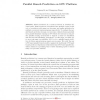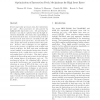126
click to vote
ICS
2009
Tsinghua U.
14 years 12 months ago
2009
Tsinghua U.
Modern processors require highly accurate branch prediction for good performance. As such, a number of branch predictors have been proposed with varying size and complexity. This ...
127
click to vote
CJ
1999
15 years 1 months ago
1999
The ability to predict the directions of branches, especially conditional branches, is an important problem in modern computer architecture and advanced compilers. Many static and...
106
click to vote
GECCO
2008
Springer
15 years 3 months ago
2008
Springer
In this work a branch prediction system which utilizes evolutionary techniques is introduced. It allows the predictor to adapt to the executed code and thus to improve its perform...
143
click to vote
CNHPCA
2009
Springer
15 years 5 months ago
2009
Springer
Abstract. Branch Prediction is a common function in nowadays microprocessor. Branch predictor is duplicated into multiple copies in each core of a multicore and many-core processor...
119
click to vote
PLDI
1995
ACM
15 years 5 months ago
1995
ACM
Correctly predicting the direction that branches will take is increasingly important in today’s wide-issue computer architectures. The name program-based branch prediction is gi...
136
click to vote
MICRO
1995
IEEE
15 years 5 months ago
1995
IEEE
Instruction Level Parallelism (ILP) speedups of an order-of-magnitude or greater may be possible using the techniques described herein. Traditional speculative code execution is t...
124
click to vote
MICRO
1995
IEEE
15 years 5 months ago
1995
IEEE
Accurate instruction fetch and branch prediction is increasingly important on today’s wide-issue architectures. Fetch prediction is the process of determining the next instructi...
124
click to vote
ISCA
1995
IEEE
15 years 5 months ago
1995
IEEE
Modern high-performance architectures require extremely accurate branch prediction to overcome the performance limitations of conditional branches. We present a framework that cat...
127
click to vote
ISCA
1995
IEEE
15 years 5 months ago
1995
IEEE
Accurate instruction fetch and branch prediction is increasingly important on today’s wide-issue architectures. Fetch prediction is the process of determining the next instructi...
125
click to vote
ISCA
1995
IEEE
15 years 5 months ago
1995
IEEE
Recent superscalar processors issue four instructions per cycle. These processors are also powered by highly-parallel superscalar cores. The potential performance can only be expl...






